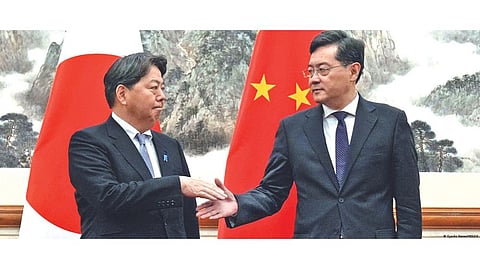

TOKYO: Japanese Foreign Minister Yoshimasa Hayashi met high-ranking Chinese officials, including Premier Li Qiang and Foreign Minister Qin Gang, on Sunday as both sides seek to find common ground amid rising tensions in the region. This is the first trip to China’s capital by a Japanese foreign minister in over three years, and comes after Chinese authorities recently arrested a Japanese national working for the pharmaceutical group Astellas on espionage charges. According to the Foreign Ministry in Tokyo, at least 17 Japanese nationals have been detained by China on spying-related charges since 2014. Five Japanese nationals currently remain in Chinese detention, two of whom have already been tried and found guilty.
While Hayashi called for transparency over the legal process regarding the detention, Qin responded that China “will handle [the case] according to the law.” Apart from seeking the swift release of the Japanese national, Hayashi and Qin also addressed other important bilateral issues, including the territorial dispute over a cluster of disputed islets in the East China Sea, Japan’s decision to restrict the export of semiconductor manufacturing equipment, Beijing’s aggressive military posture near Taiwan and Tokyo’s planned release of treated radioactive water from around the Fukushima Daiichi nuclear plant into the sea.
The meeting between Hayashi and Qin is aimed at stabilizing the bilateral relationship at a time when mutual suspicion has been growing, said Kyoko Hatakeyama, a professor at the University of Niigata Prefecture in Japan. “Japan hopes to maintain a good relationship with China, particularly when Beijing has strengthened its relationship with Russia,” she noted. “Tokyo hopes that strengthening relationship with China can be an incentive for Beijing to be a responsible power.”
With regard to the ongoing war in Ukraine, Hayashi called on China to play a responsible role in guaranteeing global peace and security. On a visit to Moscow last month, Chinese President Xi Jinping called Russian President Vladimir Putin his “dear friend” and further consolidated their “no-limits partnership.”
Tokyo is also concerned about increased Chinese military collaboration with Russia and activities in the East China Sea, including the repeated entry of Chinese coast guard vessels into disputed waters near the cluster of uninhabited islands known as the Senkakus in Japan and Diaoyu in China. While currently under Japanese administration, Beijing has claimed ownership of the disputed islets.
Meanwhile, Japan’s decisions to dramatically increase its defense budget and strengthen cooperation with allies like the US have caused China to question Tokyo’s intentions. After Japan announced its decision to restrict the export of semiconductor manufacturing equipment on Friday, Qin urged Tokyo not to join US efforts to contain China’s development. “The United States used bullying tactics to brutally suppress the Japanese semiconductor industry, and now it is repeating its old tricks against China,” Qin told his counterpart. He also accused Japan of being Washington’s “minion.” Hayashi underlined that the restrictions were “consistent with international rules,” adding that they were “not aimed at a specific country.” The curbs are in line with similar measures from the US and the Netherlands aimed at restricting China’s ability to make advanced processor chips.
This article was provided by Deutsche Welle
Visit news.dtnext.in to explore our interactive epaper!
Download the DT Next app for more exciting features!
Click here for iOS
Click here for Android